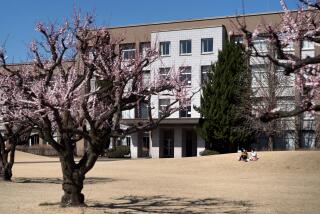Pepperdine May Build Major Campus in Japan
- Share via
Pepperdine University of Malibu has received an offer to build a $60-million campus near Tokyo as part of a controversial Japanese plan to open cultural and education centers for American and Japanese students.
Pepperdine officials stressed that negotiations are still under way and that significant differences over financing and curriculum remain. If Pepperdine accepts the offer, it would become the first university in the United States to own and operate a campus in Japan.
The offer came from a Japanese education task force established last year by the Japanese Parliament under a program aimed at attracting U.S. capital and easing trade friction between the two nations. The task force has approached several other American universities about constructing satellite campuses in Japan, but so far Pepperdine is the only school to express strong interest in the idea.
Pepperdine was chosen because one of the task force members, Keiko Hirabayashi, went to school there several years ago and recommended the university.
University officials and members of the Japanese task force met in Malibu last week to work out details of the plan, which calls for “Pepperdine University, Japan” to be opened in the Tokyo suburb of Kumagaya as early as the fall of 1989.
Thinking on Small Scale
“There are a lot more differences between us than we originally thought,” said Pepperdine University President David Davenport. “We have a lot of interest in opening a campus in Asia, but we were thinking on a smaller scale. We’re wondering whether we can handle this.”
Davenport said the biggest stumbling block for Pepperdine is financing, which would be handled in part by Sumitomo Bank, a private Japanese developer and the university. Pepperdine is hopeful that the Japanese government also will contribute a substantial donation to build the campus.
“If it’s a matter of us taking out a $60-million mortgage, we’re not going to go ahead with it,” said Glenn Webb, director of the Institute for the Study of Asian Culture at Pepperdine. “We’re hoping that the bulk of the money will be donated by private industry, but the (financing) package is still being looked at.
“We expect to be helped financially by the Japanese since we’re going to be teaching Japanese students. But if it’s not done properly, it could be a fiasco, so we’re looking for a lot of guarantees.”
It is unclear whether the university would be accredited by the Japanese Ministry of Education to offer degrees. Webb said Pepperdine might offer a four-year degree, but probably would initially offer only certificate programs for Japanese students.
As is the case with the university’s other overseas programs in London and Florence, Italy, Pepperdine students would be able to attend the Japan campus for their sophomore year, although Webb said students pursuing a degree in Asian studies might stay longer. The school would be open to both Japanese and Pepperdine students and will be taught in English. Davenport said the school would accommodate between 200 and 500 students.
According to Webb, the Japan campus would be modeled after the Malibu site, with buildings occupying 22 acres of the 150-acre property. It would include several classroom buildings, an administration center, a conference center with an adjoining 70-room hotel, chapel, cafeteria, gymnasium, swimming pool and tennis courts. Members of the powerful Mitsui family, which owns Mitsui Bank of Japan, have agreed to donate a villa at the center of a sprawling Japanese garden.
The campus would be located in Kumagaya, a city of about 140,000 people, a 25-minute train ride from Tokyo.
“We see it (the Kumagaya campus) as a place that could become an international conference center,” Hirabayashi said in a telephone interview from Japan. “We don’t have universities that give the kind of (liberal arts) education you get in America and the universities in Japan don’t give the kind of training that many companies here want.”
However, officials at the University of Texas in Austin, which rejected a similar offer to build a campus in Japan, were openly critical of the program.
“We were given lots of enticements, and they were very persistent and persuasive, but it’s my impression that the concept serves mainly as a public relations ploy,” said Richard Lariviere, director of the Center for Asian Studies at the university.
“When we looked hard at the offer, it was quite clear that the financing was questionable and they did not even have the support of the Ministry of Education.
“The other thing that was obvious was that the universities wouldn’t be allowed to get the top Japanese students.”
Hirabayashi said the group has assurances from the Ministry of Education that the school would be accredited and denied that it would only attract students who cannot get into top Japanese schools.
Among the other schools contacted were the University of Missouri, Southern Illinois University, Boston University and Bryn Mawr College, but members of the selection committee said they are waiting to see whether they can reach an agreement with Pepperdine before they make firm offers to the other colleges.
“Obviously, we’re very excited about the possibility since it’s a wonderful opportunity for cultural interchange,” Webb of Pepperdine said. “But we cannot agree to something this big until we know more about it. If we don’t stand to lose anything, we’ll do it.”
More to Read
Sign up for Essential California
The most important California stories and recommendations in your inbox every morning.
You may occasionally receive promotional content from the Los Angeles Times.













